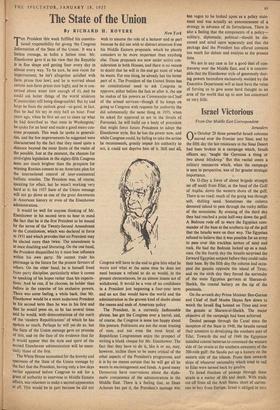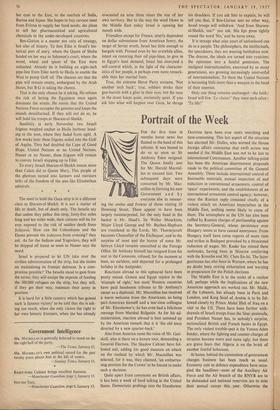Israel Victorious
From Our Middle East Correspondent Jerusalem
ON October 29 three powerful Israeli columns moved over the frontier into Sinai, and by the fifth day the last resistance in the Sinai Desert had been broken in a campaign which. Israeli officers say, 'taught the Germans a thing or two about blitzkrieg.' But this recital omits a military manceuvre which, when the campaign is seen in perspective, was of far greater strategic importance.
On 0-Day a force of about brigade strength set off south from Eilat, at the head of the Gulf of Aqaba, down the western shore of the gulf. There is no road; much of the going was through soft, shifting sand. Sometimes the column detoured inland to pass through the rocky defiles of the mountains. By evening of the third day they had reached a point half-way down the gulf. A Bedouin rode off to warn the Egyptian com- mander of the base at the southern tip of the gulf that the Israelis were on their way. The Egyptian refused to believe that it was possible for an army to pass over this trackless terrain of sand and rock. He had the Bedouin locked up as a mad- man. On the fourth day the Israelis surprised the forward Egyptian outpost before they could radio their base. By the fifth day the column had occu- pied the gunsite opposite the island of Tiran; and on the sixth day they forced the surrender of the main Egyptian garrison at Sharam-el- Sheikh, the coastal battery on the tip of the peninsula.
On the seventh day Prime Minister Ben-Gurion and Chief of Staff Moshe Dayan flew down to watch the Israeli flag hoisted on Tiran and over the gunsite at Sharam-el-Sheikh. The major objective of the campaign had been achieved.
Denied passage through the Canal since the inception of the State in 1948, the Israelis turned their attention to developing the southern port of Filet. Towards the end of 1949 the Egyptians installed coastal batteries to command the western side of the straits at the southern extremity of the 200-mile gulf; the Saudis put up a battery on the eastern side of the islands. From then onwards ships of whatever nationality which tried to sail to Eilat were turned back by gunfire.
To Israel freedom of passage through these straits is a matter of life and death. With trade cut off from all the Arab States, short of curren- cies to boy from Europe. Israel is obliged to turn her eyes to the East, to the markets of India, Burma and Japan. She hopes to buy carcase meat from Eritrea to supply her food needs; she plans to sell her pharmaceutical and agricultural chemicals to the under-developed countries.
Ben-Gurion is a master not only of strategy, but also of history. To him Eilat is Israel's his- torical port of entry, where the Queen of Sheba landed on her way to Solomon's court, where the wood, wheat and spices of the East were unloaded. Already he is building an eight-inch pipe-line from Eilat north to Haifa to enable the West to pump Gulf oil. The chances are that the pipe will remain empty, embargoed by the Arab States, but B-G is taking the chance.
That is the only chance he is taking. He refuses the risk of letting the Egyptians once again dominate the straits. He insists that the United Nations Force occupies the gunsites and keeps the islands demilitarised. If they will not do so, he will hold his troops at Sharam-el-Sheikh.
Stealthily in early November two Israeli frigates weighed anchor in Haifa harbour head- ing to the west, where they faded from sight. A few weeks later these frigates sailed into the Gulf of Aqaba. They had doubled the Cape of Good Hope. United Nations or no United Nations, Nasser or no Nasser, these frigates will remain to convoy Israeli shipping up to Eilat.
To every Israeli Sharam-el-Sheikh means more than Calais did to Queen Mary. This people of the ghettoes turned into farmers and mariners talks of the freedom of the seas like Elizabethan admirals.
The need to hold the Gaza strip is in a different class to Sharam-el-Sheikh. It is not a matter of life or death, but of death only. The Israelis say that unless they police this strip, forty-five miles long and ten miles wide, their citizens will be for ever exposed to the risk of sudden death from fedayeen. How can the Colombians and the Danes prevent the fedayeen from crossing? they ask. As for the Indians and Yugoslays, they will be shipped off home as soon as Nasser says the word.
Israel is prepared to let UN take over the civilian administration of the strip, but she insists on maintaining its frontier defences. Is a com- promise possible? The Israelis stand to gain from the terms; they will escape the expense of feeding the 300,000 refugees on the strip, but they will, if they get their way, maintain their army in position.
It is hard for a little country which has gained such 'a famous victory' to be told that she is ask- ing too much, when she only claims the right to her own historic frontiers, when she has already evacuated an area three times the size of her own territory. But to the way the wind blows in the Middle East today Israel is opening her mouth wide.
Friendless except for France, utterly dependent on dollar subventions from American Jewry, the target of Soviet wrath, Israel has little enough to bargarn with. Pressed even by her erstwhile allies, intent on restoring their oil pipe-lines, to give in to Egypt's least demand, Israel has exercised a self-control which, in the light of the character- istics of her people, is perhaps even more remark- able than her martial feats.
True, the extreme Herut Party screams, 'Not another inch back'; true, soldiers stroke their gun-barrels with a glint in their eyes, but the man in the street keeps quiet, ominously quiet. If you ask him what will happen over Gaza, he shrugs his shoulders. If you ask him to explain, he will tell you that, if Ben-Gurion sees no other way, Israel troops will withdraw. 'And from Sharam- el-Sheikh, too?' you ask. His lips press tightly round the word 'No,' and he turns away.
It is strange what nine years of nationhood can do to a people. The philosophers, the intellectuals, the speculators, they are wearing battledress now. The dreams, the ideals are turned into cynicism; the optimism into a fateful pessimism. The maligned internationalists, execrated by so many generations, are growing increasingly mistrustful of internationalism. To them the United Nations is becoming little more than a weapon in the hand Of their enemies.
Only one thing remains unchanged—the faith : Israel will live. 'Le chaim!' they toast each other : 'To life!'



































 Previous page
Previous page